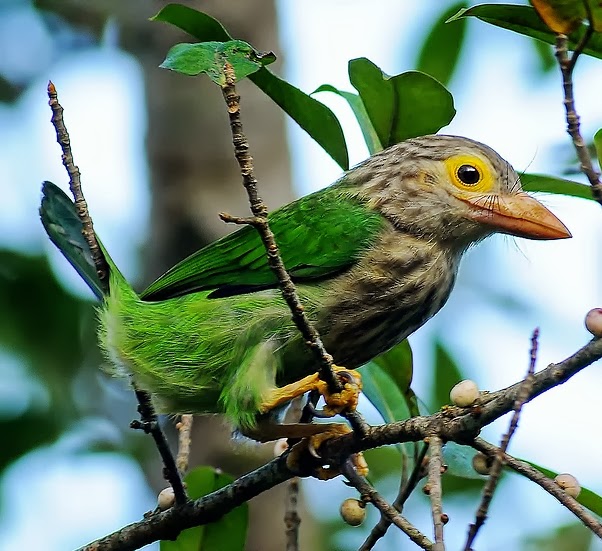 |
| (Photo from Flickr) |
Common name:
lineated barbet (en); barbudo-riscado (pt); barbu rayé (fr); barbudo listado (es); streifenbartvogel (de)
Taxonomy:
Order Passeriformes
Family Capitonidae
Range:
This species is found from northern-eastern India and Nepal, through Bangladesh and Myanmar and into Vietnam, Thailand, northern Malaysia and marginally into southern China.
Size:
These birds are 28-29 cm long and weigh 75-100 g.
Habitat:
The lineated barbet is mostly found in deciduous and evergreen tropical forests, including moist and dry forests. They also use plantations, orchards and urban areas.
Diet:
They feed mainly on fruits, particularly those of jumbu Syzygium spp., Madras thorn Pithecellobium dulce, Benjamin fig Ficus benjamina, fishtail palm Caryota mitis and neem Azadirachta indica and several exotic species. They also take flowers and nectar, and also hunt variou insects, such as ants, cicadas, dragonflies, crickets, locusts, beetles, moths and mantids, as well spiders, lizards, tree frogs and the eggs of other birds.
Breeding:
Lineated barbets breed during the local rainy season. They nest in tree cavities, which they mostly excavate into dead wood, but sometimes also on live trunks and branches. There the female lays 2-4, which are incubated by both parents for 13-15 days. The chicks are fed by both parents and fledge 35-28 days after hatching.
Conservation:
IUCN status – LC (Least Concern)
This species has a very large breeding range and, although the population size has not been quantified, it is reported to be locally common to fairly common. The population is suspected to be stable in the absence of evidence for any declines or substantial threats.







